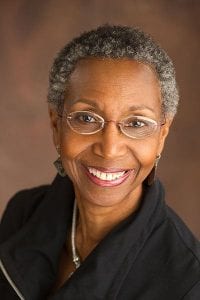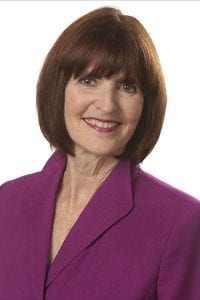April 10, 2018
Register for the Building the Beloved Community workshop
Building the Beloved Community: When Good Intentions Are Not Enough
Wednesday, April 18 at 3:30 p.m.
Aquinas Lounge
Register now (required).
![]() Led by Dr. Gwendolyn Jordan Dungy and Dr. Caryn McTighe Musil, this interactive workshop is designed to reveal why so much activity about diversity, inclusion, and equity does not seem, in the end, to satisfy anyone or advance stated commitments sufficiently despite the most well-meaning plans. This workshop will focus on how systems-thinking may be used to effect deeper, more pervasive cultural, intellectual, and structural changes necessary to build a Beloved Community at Providence College.
Led by Dr. Gwendolyn Jordan Dungy and Dr. Caryn McTighe Musil, this interactive workshop is designed to reveal why so much activity about diversity, inclusion, and equity does not seem, in the end, to satisfy anyone or advance stated commitments sufficiently despite the most well-meaning plans. This workshop will focus on how systems-thinking may be used to effect deeper, more pervasive cultural, intellectual, and structural changes necessary to build a Beloved Community at Providence College.
After defining agreed upon elements, principles, and practices of such a community, participants at the workshop will drill down on levels of action at the college and within centers of responsibility from where their work life at Providence College is located. In addition, the workshop will help participants identify ways to disrupt unproductive behavioral patterns and examine policies, practices, structures, and conceptual framings that might be preventing more positive change. The goal of ongoing work will be to replace old patterns with new ones of co-creation, mutual commitments, and coordination to help achieve the hard and sustained work of building a Beloved Community.
Pre-readings:
Frank D. Golom from Loyola University Maryland, “Alternate Conversations for Creating Whole-System Change around Diversity and Inclusion,” Diversity & Democracy, Vol. 21, Winter 2018.
Kathy Takayama, Matthew Kaplan, and Alison Cook-Sather, “Advancing Diversity and Inclusion through Strategic Multilevel Leadership,” Liberal Education, Vol. 103, No. ¾, Summer/Fall 2017.

Gwendolyn Jordan Dungy, NASPA-Student Affairs Administrators in Higher Education, Executive Director Emeritus
An accomplished speaker, leader, and educator, Gwendolyn Jordan Dungy served as executive director of NASPA from 1995– 2012. In her capacity as a national advocate for students and student affairs in higher education, Dr. Dungy pursued a number of initiatives designed to enhance the association’s role in public policy, research, professional development, and student learning and assessment. She initiated NASPA’s signature program on civic learning and democratic engagement, and she remains a champion of NASPA’s undergraduate mentoring program. Since 2003, she has had a particular interest in the readiness of colleges and universities for the returning student veteran.
Before joining NASPA, Dr. Dungy was associate director of the Curriculum and Faculty Development Network and coordinator of the National Diversity Network at the Association of American Colleges & Universities (AAC&U). In this role she was part of the leadership team working on the AAC&U groundbreaking national initiative, American Commitments: Diversity, Democracy, and Liberal Learning. Previously, she was Division Dean for Humanities and Arts at the County College of Morris (NJ), Instructional Dean and Dean of Student Development at Montgomery College (MD), Director of Counseling at Catonsville Community College (MD), and a counseling faculty member at St. Louis Community College (MO). She began her career in education as a high school English teacher in Harvey, Illinois.
During academic year 2014-2015, Dr. Dungy assumed the role of interim senior vice president for Student Services at Montgomery College, the largest community college in the state of Maryland with 60,000 students. In her senior leadership role at Montgomery College, the college-wide deans responsible for enrollment, financial aid, recruitment, welcome centers, the ACES Program, student engagement, counseling and advising, disability services, veterans, TRIO, EOC, athletics and all other areas of support services for student success fell within her area of responsibility.
Dr. Dungy consults with colleges and universities regarding campus climate for diversity, inclusion, and equity. She has had extensive national and international travel to provide workshops for student affairs staff related to the professional competencies of the field. She has given speeches at conferences and meetings about student learning outcomes, new student populations, the co-curriculum redefined, first-generation and low-income college students, leadership, and innovation among other topics.
She has served for several years as faculty for the Association of American Colleges & Universities (AAC&U’s) well-regarded High Impact Practices institutes. Currently, she is a Senior Fellow at the Association of American Colleges and Universities (AAC&U) in the Office of Diversity, Equity, and Student Success. She also serves on the AAC&U Journal Advisory Board.
Dr. Dungy’s volunteer experience includes serving as a member of the United States Army Education Advisory Committee. She has served as a member of the board of directors of HEADS UP – A University Neighborhood Initiative in Washington, DC; the Association Mutual Health Insurance Company; the American Association of University Women’s Legal Advocacy Fund (AAUW); the AAUW Educational Foundation; the Morris Shelter and the Morris Museum in NJ, and as a trustee of Berkeley College in NY and NJ. She is serving in her eleventh year as a member of the Board of Trustees at Gettysburg College in Pennsylvania.
Dr. Dungy is the author of numerous articles in books, journals and magazines and co-editor of several books in higher education. She co-edited two books with Dr. Maggie Culp: Increasing Adult Learner Persistence and Completion Rates and Building a Culture of Evidence in Student Affairs; She co-edited with Dr. Shannon Ellis Exceptional Senior Student Affairs Administrators’ Leadership: Strategies, and Competencies for Success. She also coordinated the collaborative and was a contributing author for the oft-cited Learning Reconsidered: A Campus-Wide Focus on the Student Experience and Learning Reconsidered II: A Practical Guide to Implementing a Campus-Wide Focus on the Student Experience. She writes a blog titled It’s About Students.
A licensed psychologist and a nationally certified professional counselor and career counselor, Dr. Dungy earned B.S. and M.S. degrees from Eastern Illinois University, the M.A. degree from Drew University in New Jersey, and a Ph.D. from Washington University in St. Louis. She has received honorary doctorate degrees from Gettysburg College, Berkeley College, Mitchell College and Eastern Illinois University. In 2012, NASPA named its undergraduate leadership summer program the Dungy Leadership Institute (DLI). In 2017, NASPA honored her as the inaugural recipient of the Bobby E. Leach Award for Diversity, Equity, and Inclusion.

Caryn McTighe Musil
Association of American Colleges and Universities
Caryn McTighe Musil is Senior Scholar and Director of Civic Learning and Democracy Initiatives at the Association of American Colleges and Universities after having served as Senior Vice President of the Office of Diversity, Equity, and Global Initiatives for fourteen years. She has been writing, speaking, and directing national projects about diversity, democracy, global learning, civic engagement, women, and social responsibility for the past three decades. A frequent keynote speaker and workshop leader, Dr. Musil has served as a consultant to more than two dozen colleges and universities, most recently with Dr. Gwendolyn Dungy completing a Diversity Audit for Maryland Institute College of Art (MICA) in 2016.
Dr. Musil was the lead author of A Crucible Moment: Civic Learning and Democracy’s Future, a national report released at the White House in 2012 that represents the collective wisdom and research of a broad constituency in higher education. A Crucible Moment calls for action from across sectors in and out of higher education to advance civic learning and democratic engagement from grammar school to graduate school and move programs from niches to norms.
This national report is the latest in a long line of investigations about democracy, diversity, and higher education that Dr. Musil has led. From 1992-2002, she was a senior leader at AAC&U of American Commitments: Diversity, Democracy, and Liberal Learning, which focused on the incorporating into the curriculum and institutional life struggles for justice and full recognition for groups that had been denied democracy’s promises even as they shaped the nation that too often erased them from its history. In that initiative, Dr. Musil directed three generations of a faculty and curriculum development project that involved 130 institutions and over 500 faculty members. That work led to her leadership of the Ford Foundation-funded Tri-National Project with educators from India, South Africa, and the United States who explored the role of higher education in diverse democracies. Complementing that global focus has been her service for eighteen years on the Steering Committee of the International Consortium for Higher Education, Civic Responsibility, and Democracy in partnership with the Council of Europe.
Dr. Musil also redefined AAC&U’s global portfolio as Senior Vice President into a thirteen-year year initiative called Shared Futures: Global Learning and Social Responsibility. In addition to publications, conferences, and consulting, Shared Futures was comprised of a series of funded curriculum initiatives with colleges and universities seeking integrate global learning across general education and the major, breaking out of the strait jacket of only study abroad. She directed the project that created a Global Learning Rubric within AAC&U’s VALUE Rubrics for College Learning Outcomes.
In two National Endowment for the Humanities proposals she wrote and directed in the last six years, Dr. Musil combined an exploration of diversity, community, and global issues: Bridging Cultures to Form a Nation: Community, Difference, and Democratic Thinking, which targeted humanities courses in ten nationally selected community colleges and Citizenship Under Siege through which seven community colleges held public forums and programs to engage in deep dialogue about historic and contemporary debates about who counts as American citizens.
Currently she is directing a national project to seed civic learning in students’ majors, one of the most untilled acreages in higher education, by challenging departments to take leadership in cultivating a civic lens and social responsibility as a dimension of disciplinary inquiry and practice in their major field of studies. A national call for examples has led to a treasure trove of innovative departmental designs highlighted in publications, a webinar, and conference presentations. The project is now offering mini-grants to support more departments in advancing discipline-appropriate designs.
Some of Caryn McTighe Musil’s selected publications include The Courage to Question: Women’s Studies and Student Learning (ed); Assessing Campus Diversity Initiatives (co-author); Civic Prompts: Making Civic Learning Routine Across the Disciplines; “A Step Away from Complacent Knowing: Reinvigorating Education for Democracy through the Humanities” in Journal of Humanities; “Diversity: An Investment in Democracy and Academic Excellence,” in Re-envisioning the Public Research University, forthcoming; “Diversity and Democratic Justice: Necessary Twin Compasses for Civic Engagement and Social Innovation,” forthcoming in The Civic Mission of Higher Education: Social Innovation and Civic Engagement by Mlyn and McBride, Stylus, 2018.
Before working at AAC&U, Caryn McTighe Musil was a faculty member in English and women’s studies for sixteen years at La Salle University in Philadelphia which had just gone co-educational the year before she came after being an all-male institution for one hundred years. Dr. Musil received her B.A. from Duke University and her M.A. and Ph.D. in English from Northwestern University. She was honored with the 2013 Outstanding Contribution to Higher Education Award from NASPA and the Donna Shavlik Award from the American Council on Education in 2006 for her sustained commitment to advancing women in higher education.





